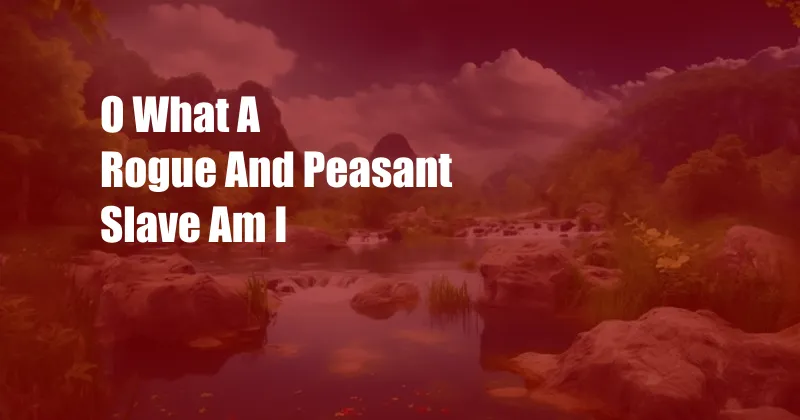
O, What a Rogue and Peasant Slave Am I
In the tapestry of Shakespeare’s immortal tragedies, “Hamlet” stands as a poignant masterpiece, its characters and themes resonating across centuries. One of the most memorable utterances in this play is Hamlet’s soliloquy, “O, what a rogue and peasant slave am I!”
This line captures Hamlet’s tormented state of mind as he grapples with inaction and self-doubt. Spurred by the ghost of his murdered father and the machinations of his uncle Claudius, Hamlet finds himself torn between duty and procrastination.
Hamlet’s Internal Struggle
The “rogue” to which Hamlet refers symbolizes his perceived weakness and inaction. Despite the weight of his father’s demand for vengeance, Hamlet hesitates, plagued by doubts and fear. His inability to act contrasts sharply with the decisive actions of his antagonist, Claudius, who swiftly and ruthlessly seizes the throne.
The “peasant slave” represents Hamlet’s self-loathing. He feels a profound sense of inferiority and unworthiness compared to the valiant and honorable characters of his imagination. Hamlet’s inaction and self-criticism stem from a deep-seated belief in his own inadequacies.
Definition of Rogue and Peasant Slave
In the context of Hamlet’s soliloquy, “rogue” refers to a dishonest or untrustworthy person. Hamlet applies this term to himself due to his perceived lack of action and resolve.
“Peasant slave” signifies a person of low social status, who is subservient to others. Hamlet uses this phrase to express his feelings of insignificance and inferiority.
Hamlet’s Journey of Self-Realization
As the play progresses, Hamlet’s internal struggle intensifies. Through encounters with characters like Polonius and Ophelia, he confronts his own mortality and the futility of revenge. The play’s tragic denouement forces him to confront his own flawed nature and the consequences of his inaction.
Hamlet’s soliloquy serves as a window into the depths of his character, revealing his struggles with self-doubt, inaction, and the complexities of human nature. It is this psychological realism that makes “Hamlet” such a timeless and poignant masterpiece.
Latest Trends and Developments
Modern interpretations of “Hamlet” often explore the character’s psychological state through the lens of psychoanalysis. Hamlet’s procrastination and self-doubt have been linked to themes of Oedipus complex, unresolved grief, and existential angst.
Social media platforms and online forums have also sparked discussion about Hamlet’s character and the relevance of his struggles in contemporary society. Young people have resonated with Hamlet’s feelings of alienation, uncertainty, and the search for purpose.
Tips and Expert Advice
- When analyzing Hamlet’s soliloquy, pay attention to the context and subtext. Consider the character’s motivations and the themes of the play.
- Explore the psychological aspects of Hamlet’s inaction. Consider the role of grief, guilt, and self-doubt in shaping his character.
- Compare and contrast Hamlet’s character with other tragic heroes in literature. Identify the similarities and differences in their struggles and motivations.
By following these tips, readers can gain a deeper understanding of Hamlet’s character and the significance of his soliloquy in the context of the play.
Explanation of Tips and Expert Advice
Analyzing the context and subtext of Hamlet’s soliloquy is crucial for understanding its full meaning. By considering the character’s motivations and the themes of the play, readers can grasp the significance of his words.
Exploring the psychological aspects of Hamlet’s inaction provides insights into the complexities of his character. Grief, guilt, and self-doubt are powerful emotions that shape his actions and decision-making.
Comparing Hamlet’s character with other tragic heroes in literature offers a broader perspective on the theme of human suffering and the challenges faced by heroes in literature.
FAQ on “O, What a Rogue and Peasant Slave Am I”
- What does “rogue” mean in this context?
It refers to a dishonest or untrustworthy person, representing Hamlet’s perceived lack of action and resolve. - Why does Hamlet feel like a “peasant slave”?
He feels inferior and unworthy compared to the valiant and honorable characters of his imagination. - What is the significance of this soliloquy?
It reveals Hamlet’s internal struggles, his self-doubt, and the complexities of his character.
Conclusion
“O, what a rogue and peasant slave am I!” remains one of the most famous and powerful lines in English literature. Through Hamlet’s soliloquy, Shakespeare explores the timeless themes of inaction, self-doubt, and the struggle for meaning in life.
The article has provided a comprehensive analysis of this iconic line, discussing its definition, historical context, and the latest trends and developments in its interpretation. By understanding the complexities of Hamlet’s character and the significance of his soliloquy, readers can gain a profound appreciation for the enduring power of Shakespeare’s tragedies.
Are you interested in further exploring the themes and characters of “Hamlet”? Let us know in the comments below.